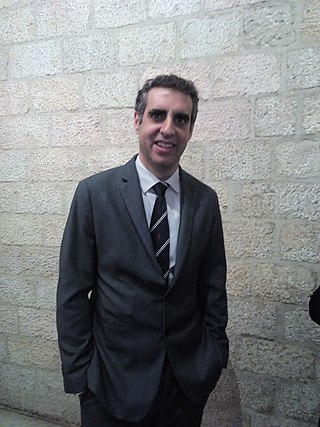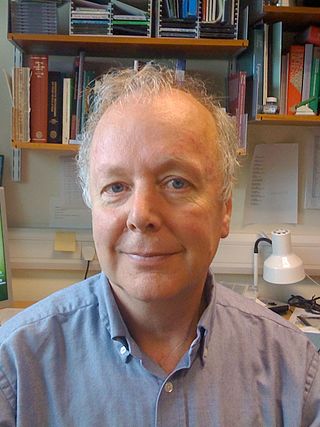
In biology, epigenetics is the study of heritable traits, or a stable change of cell function, that happen without changes to the DNA sequence. The Greek prefix epi- in epigenetics implies features that are "on top of" or "in addition to" the traditional genetic mechanism of inheritance. Epigenetics usually involves a change that is not erased by cell division, and affects the regulation of gene expression. Such effects on cellular and physiological phenotypic traits may result from environmental factors, or be part of normal development. Epigenetic factors can also lead to cancer.

Manel Esteller graduated in medicine from the University of Barcelona in 1992, where he also obtained his doctorate, specializing in the molecular genetics of endometrial carcinoma, in 1996. He was an invited researcher at the School of Biological and Medical Sciences at the University of St Andrews, Scotland, during which time his research interests focused on the molecular genetics of inherited breast cancer.

Sir Adrian Peter Bird is a British geneticist and Buchanan Professor of Genetics at the University of Edinburgh. Bird has spent much of his academic career in Edinburgh, from receiving his PhD in 1970 to working at the MRC Mammalian Genome Unit and later serving as director of the Wellcome Trust Centre for Cell Biology. His research focuses on understanding DNA methylation and CpG islands, and their role in diseases such as Rett syndrome.
Michael J. Meaney, CM, CQ, FRSC, is a professor at McGill University specializing in biological psychiatry, neurology, and neurosurgery, who is primarily known for his research on stress, maternal care, and gene expression. His research team has "discovered the importance of maternal care in modifying the expression of genes that regulate behavioral and neuroendocrine responses to stress, as well as hippocampal synaptic development" in animal studies. The research has implications for domestic and public policy for maternal support and its role in human disease prevention and economic health.

Albert Gjedde: is a Danish-Canadian neuroscientist. He is Professor of Neurobiology and Pharmacology at the Faculty of Health Sciences and Center of Neuroscience at the University of Copenhagen. He is currently also Adjunct Professor of Neurology and Neurosurgery in the Department of Neurology, Montreal Neurological Institute, McGill University, Montreal, Quebec, Canada, Adjunct Professor of Radiology and Radiological Science in the Division of Nuclear Medicine, Department of Radiology and Radiological Science, Johns Hopkins University, Baltimore, Maryland, US, Adjunct Professor of Translational Neuropsychiatry Research, University of Southern Denmark, Odense, Denmark, and adjunct professor of psychiatry at Tabriz University of Medical Sciences, Tabriz, East Azerbadjan, Iran.
Gabriel Leon "Gabbie" Plaa was an American-Canadian toxicologist. A specialist of hepatotoxicity, he held various administrative position at Université de Montréal from 1968 to 1989, receiving the grade of professor emeritus upon his retirement in 1996. Over the course of his career he was president of several scientific society and served in editorial capacity for numerous scientific journals. Amongst many awards, he was the first recipient of the Society of Toxicology's (SOT) Achievement Award, an award granted to a "promising young scientist".
Behavioral epigenetics is the field of study examining the role of epigenetics in shaping animal and human behavior. It seeks to explain how nurture shapes nature, where nature refers to biological heredity and nurture refers to virtually everything that occurs during the life-span. Behavioral epigenetics attempts to provide a framework for understanding how the expression of genes is influenced by experiences and the environment to produce individual differences in behaviour, cognition, personality, and mental health.

Randy Jirtle is an American biologist noted for his research in epigenetics, the branch of biology that deals with inherited information that does not reside in the nucleotide sequence of DNA. Jirtle retired from Duke University, Durham, NC in 2012. He is presently Professor of Epigenetics in the Department of Biological Sciences at North Carolina State University, Raleigh, NC. Jirtle is noted for his research on genomic imprinting, and for his use of the Agouti mouse model to investigate the effect of environmental agents on the mammalian epigenome and disease susceptibility.

Epigenetic therapy refers to the use of drugs or other interventions to modify gene expression patterns, potentially treating diseases by targeting epigenetic mechanisms such as DNA methylation and histone modifications.

Gustavo Turecki is a Canadian psychiatrist, suicidologist, neuroscientist who is a professor at McGill University in Montreal, Quebec, Canada. He holds a Tier 1 Canada Research Chair Tier in Major Depressive Disorder and Suicide. He is the sitting Chair of the Department of Psychiatry at McGill University, the Scientific Director of the Douglas Research Centre, and the Psychiatrist-in-Chief of the Centre intégré universitaire de santé et de services sociaux de l’Ouest-de-l’Île-de-Montréal. He works at the Douglas Mental Health University Institute, where he heads both the McGill Group for Suicide Studies and the Depressive Disorders Program, and is the co-director of the Douglas Bell-Canada Brain Bank.
Michel Bouvier is a Canadian biochemist and molecular pharmacologist. He is a professor of biochemistry and molecular medicine at Université de Montréal; a principal investigator and the chief executive officer at the Institute for Research in Immunology and Cancer; and an associate vice-president in Research, Scientific Discovery, Creation, and Innovation at Université de Montréal. His work focuses on the study of cell signaling towards the discovery of new pharmaceutical drugs.

Frances A. Champagne is a Canadian psychologist and University Professor of Psychology at the University of Texas at Austin known for her research in the fields of molecular neuroscience, maternal behavior, and epigenetics. Research in the Champagne lab explores the developmental plasticity that occurs in response to environmental experiences. She is known for her work on the epigenetic transmission of maternal behavior. Frances Champagne's research has revealed how natural variations in maternal behavior can shape the behavioral development of offspring through epigenetic changes in gene expression in a brain region specific manner. She won the NIH Director's New Innovator Award in 2007 and the Frank A. Beach Young Investigator Award in Behavioral Neuroendocrinology in 2009. She has been described as the "bee's knees of neuroscience". She serves on the Committee on Fostering Healthy Mental, Emotional, and Behavioral Development Among Children and Youth in the United States.
Rhian Merry Touyz Koppel is a Canadian medical researcher. She is currently serving as the Executive Director and Chief Scientific Officer of the Research Institute of the McGill University Health Centre in Montreal, Canada, since 2021. A clinician scientist, her research primarily focuses on hypertension and cardiovascular disease.
Pharmacoepigenetics is an emerging field that studies the underlying epigenetic marking patterns that lead to variation in an individual's response to medical treatment.
Hans H. Zingg is a Professor Emeritus in the Department of Pharmacology and Therapeutics and Wyeth-Ayerst Chair in Women's Health at McGill University in Montreal, Quebec, Canada.
Dr. Freda Miller, FRSC is a developmental neurobiologist at the Hospital for Sick Children Research Institute and a professor at the University of Toronto. Dr. Miller holds a Canada Research Chair in developmental neurobiology and her work focuses on development and regeneration of neurons.

Nadine Provençal is an assistant professor at Simon Fraser University and Investigator at BC Children's Hospital Research Institute. In 2020, she was recognized by the Canadian Institute for Advanced Research (CIFAR) with an appointment to CIFAR Azrieli Global Scholar.

Andrea Baccarelli is an Italian American epigeneticist and clinical endocrinologist, best known for his academic contributions in the field of epigenetics, mitochondriomics, and computational epigenomics, with a research focus on investigating the impact of environmental exposures on human health. He currently serves as the 10th dean of the Harvard T.H. Chan School of Public Health.
Sarah Kimmins is a Canadian scientist whose research explores the role of epigenetics in germ cell development, fertility and offspring health. She is a professor in epigenomics, development and disease at the University of Montreal, in the Department of Pathology and Cellular Biology, in the Faculty of Medicine and is Senior Group Leader at the Centre de Recherche du Centre Hospitalier de l'Université de Montréal.

Matthias Schwab is a German doctor and university lecturer. He is director of the Dr. Margarete Fischer-Bosch-Institute of Clinical Pharmacology located on the campus of the Robert-Bosch-Hospital in Stuttgart, an institution of the Robert Bosch Stiftung, and holder of the Chair of Clinical Pharmacology at the University of Tübingen as well as Medical Director of the Department of Clinical Pharmacology at the University Hospital Tübingen.











